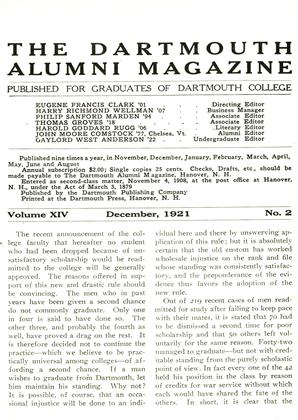A belief that the spirit of the College has reached a new high point, that the undergraduates are doing more serious thinking than ever before, and that the student body will come to understand that the proposed changes in the administrative policies are designed as much for its benefit as for the maintenance of the College standards was expressed by President Hopkins in an interview given to The Dartmouth recently.
President Hopkins has viewed with approval the increasing tendency on the part of undergraduates to get at the root of all matters, and to understand clearly the principles involved before definitely making up their minds as to the worth of the projects in question. In particular, he expressed gratification at the discussion evoked by the recent rulings on men not being readmitted after once flunking out, and on the proposed plan for increasing the point requirement for graduation.
"I think," he said, "that there is more of a spirit of buoyancy among the undergraduates than ever before; more of a feeling of alertness, of interest in the affairs of the College. This interest will find its reaction in greater participation in undergraduate activities, which will in turn inevitably lead to the furthering of the purposes of the College."
That the administration welcomes rather than resents the intrusion of undergraduate interest and suggestion into official consideration of college policies was emphasized by President Hopkins. At this point he facetiously remarked that in the past there have been alarmists who have felt that the administration might be swept off its feet by reason of too high a regard for student opinion.
"This fear, of course, is unfounded," said President Hopkins. "But at the same time it must not be inferred that the opposite is true. The administration is anxious to hear suggestions and even criticism from the undergraduate body, and no important decision would ever be made without undergraduate opinion being carefully considered beforehand."
The President took occasion to outline the new selective processes by which applicants for the class of 1926 will be admitted. The details of this plan will be shortly available for public announcement.
For the most part, the plan is an elaboration of the principle adopted last year by which a man would be admitted to Dartmouth provided he stood in the first quarter of his class in school. The new system, however, goes further than this. It is intended to provide for excellence in other activities as well as in scholarship, and no man will be admitted unless he shows a well-rounded development on all sides. However, a man of exceptional scholastic ability will always be admitted without question.
The main feature of the new plan is an elaborate provision for personal rating of the applicant, patterned in large measure after the system in vogue at Columbia University. Not only will it require a rating from the principal of- the school from which the man comes, but also from somebody actively connected with Dartmouth, either an undergraduate or a recent alumnus.
The principle of geographical representation which gives priority to men from New Hampshire, or from states west of the Mississippi or south of the Potomac will be adhered to, according to President Hopkins, because "the College is seeking to extend its sphere of influence into as many centers as possible, and this enrollment of undergraduates from sections of the country hitherto untouched by the College will do much toward making Dartmouth an institution truly representative of the whole country."
President Hopkins mentioned briefly the history of the various types of selective processes in vogue among the colleges of the country, and compared the Dartmouth idea of admission by certificate with that of Harvard, Yale, and Princeton which still adhere very largely to the examination system.
A new feature of the question of the proposed increase of the point requirement, brought out by the President, was the provision for the placing on probation of a man who at any time during his course fell below the number of points required at that particular stage of his four years' work. This, would make-invalid one chief objection to the scheme —that no practical method was available of weeding out undesirables who failed to do anything more than that absolutely required of them either in scholastic or extra-curriculum activity.
 View Full Issue
View Full Issue
More From This Issue
-
 Article
ArticleALUMNI COUNCIL MEETS
December 1921 By EUGENE F. CLARK -
 Article
ArticleTHE BURYING GROUND
December 1921 By EDWIN JULIUS BARTLETT '72 -
 Article
ArticleTHE FRESHMAN CLASS
December 1921 By E. GOKDON BILL -
 Article
ArticleThe recent announcement of the college faculty that hereafter no student
December 1921 -
 Article
ArticleNEW FACULTY REGULATIONS
December 1921 -
 Sports
SportsFOOTBALL
December 1921
Article
-
 Article
ArticleTrustees Hold Fall Meeting
DECEMBER 1929 -
 Article
ArticleNew York Dinner
January 1949 -
 Article
Article$500,000 Regional Grant
November 1968 -
 Article
ArticleSenior Citizens
May/June 2002 -
 Article
ArticleCross Country
November 1954 By CLIFF JORDAN '45 -
 Article
ArticleA FRESHMAN'S EXPERIENCE
DECEMBER 1929 By Professor Edwin J. Bartlett


